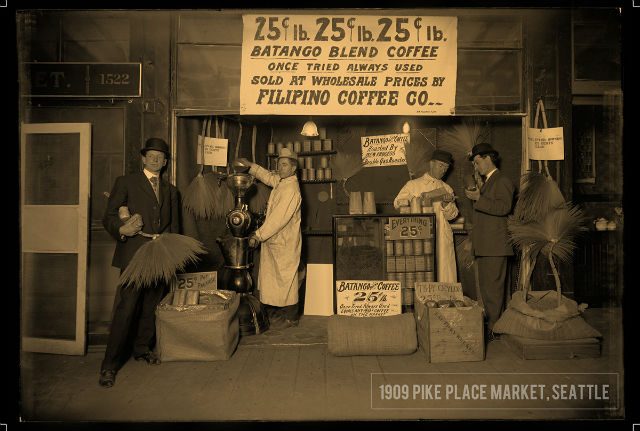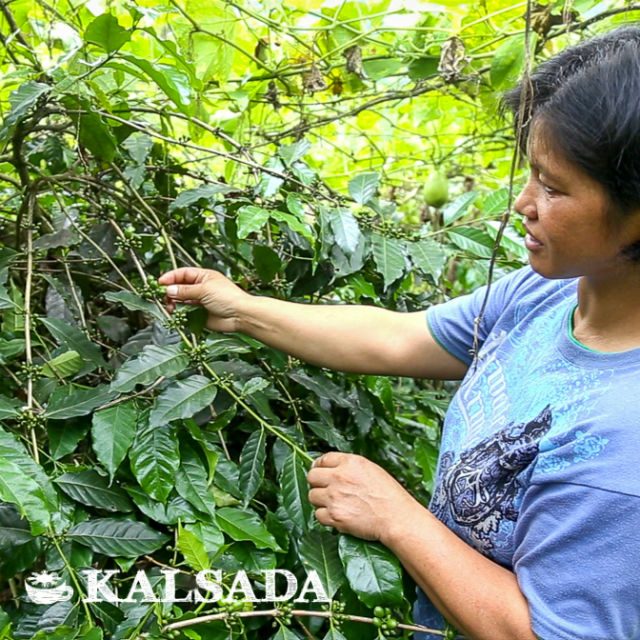SUMMARY
This is AI generated summarization, which may have errors. For context, always refer to the full article.
 People often ask us how the name of our coffee company, “Kalsada”, came to be.
People often ask us how the name of our coffee company, “Kalsada”, came to be.
Kalsada means road, and our company has definitely been on a rocky one on our journey to reinvigorate Philippine coffee. As our journey unfolds, you’ll learn more about the Kalsada team, our roles, and what brought us to this shared table. We can tell you this: it’s been a long road to this point.
The journey began with a dusty old photograph. I was doing research in one of the libraries at the University of Washington. I was a young, idealistic Filipina-American undergrad. The photograph showed a small stall, operated by the “Filipino Coffee Company,” in the now famous Pike Place Market.
Sepia-tinted, but crisp, the picture had been taken in 1909 (more than 60 years before the first Starbucks opened its doors in the exact same district!). Roughly a century later, here I stood. Questions emerged: what is the current state of coffee production in the Philippines, and how could I go about sharing this story with the world?

Next, as a graduate student at Parsons, in New York, I was still haunted by these questions. My research had uncovered some startling insights: over a century ago, coffee was a major export crop for the Philippines. Diseased crops devastated production, farmers started favoring more lucrative crops, and the industry never fully recovered.
Talking with fellow Filipino-American coffee connoisseurs, I took this as a challenge to promote positive social change in a country that has played such a powerful part in defining who I am. 
Reviving the coffee industry
As a result of this research, the desire to revitalize the Philippine coffee industry was planted.
In 2013, Kalsada was officially born, founded through a partnership between myself and a group of diverse people: passionate coffee fans, concerned members of the Filipino diaspora, and digital mavens.
Kalsada exists not only to uncover that past but to build and create from it. We have been sharing and creating the Philippine coffee story, and we will be championing for Philippine coffee that will help enable Filipino coffee growers to take part in the growing demand for artisanal coffee.
The specialty coffee market is expanding rapidly in Manila, but cafés are serving almost exclusively imported coffee. A high-value commodity, coffee from a new origin – the Philippines – has the potential to bring big returns for farmers.
Later that year, I officially moved to the Philippines. I vividly recall interviewing farmers in Candoni and learning about their desire and need for a farm-to-market road, drinking tapoy (rice wine) in the terraces during a Christmas holiday party in Asipulo, Ifugao.
I learned about the history of coffee in the Ifugao region, devouring the made-to-order pancakes and coffee at the Bontoc Market, eating Manang Melde’s tsokolate and puto (sweet sticky rice) at the stalls in Dumaguete. I watched and waited by the muddy roadside in Tadian for our jeepney to be pulled so that we could continue on to the community of Masla to meet with coffee producers.
Then back to Manila after two weeks on the road, opening my backpack filled with coffee samples from all over the Philippines.
And after more than 18 months living here, Kalsada has come to mean so much more. It now also represents the farmers, friends, colleagues, family, and everyone outside of our team who have supported and helped us get to this point. It represents the connection between the struggling farmers out in the hinterlands, to the coffee drinkers in the city. The power, the accessibility, the fragility of that road – and to the farmer, it represents opportunity and livelihood.
Goal reached
Our name at its inception represented the journey of coffee from seed to cup. It now represents not only our journey from Seattle, Paris, and everywhere in between, but also the long road ahead in building capacity for quality coffee at the farm level.
Kalsada made huge strides in 2014. We partnered with our first 4 farms, identified resources and infrastructure needed, bought and roasted our first batches of beans, and sold out of our inventory at pop-ups, farmers’ markets and Third Wave cafés across the Philippines.
In 2015 we met our goal of raising $15,000 (about P645,000) with a crowdfunding campaign on Kickstarter.
Kalsada is working tirelessly to ensure its ability to invest in infrastructure and education efforts with our farm partners. This includes a micro-washing station for a co-op we’re working with in the Cordillera Region that will save farmers time and work, and centralize knowledge in the community it serves. For other farm partners, low-cost interventions like $30 (P1,320) drying beds can drastically improve the quality and value of their coffee.
Kalsada team members hail from Seattle, Manila, Paris, Miami, Vancouver (with as many circuitous routes). Our collaboration is made possible by many online chats and Google hangouts, lubricated by several cups of coffee to soothe the time differences.
As passionate as we are about coffee and improving economic conditions in the Philippines, not all of us can claim the mantle of coffee connoisseur or die-hard activist credentials, or even Philippine blood running through our veins.
But we are connected by a curiosity (shared with a growing number around the world) about where our food comes from, and a belief that the labor of providing that food should be fairly compensated.
More than that, we’re bound by a belief that a seed-to-cup ethos is not just about where your coffee comes from, but also about the spaces in which it’s sipped. The journey in the coming months will involve uncovering coffee’s past, changing its present, and pushing for a better future in the Philippines. – Rappler.com
Carmel has always wanted to find a way to honor her heritage and give back to communities from which she hails. As a community organizer in Seattle, she was inspired to get involved in coffee and development after seeing an early 20th century photo of Pike Place merchantmen hawking Filipino coffee. She enjoys dance parties and ‘cortados.’
For more information on Kalsada Coffee, visit their website at www.kalsada.org
Add a comment
How does this make you feel?
There are no comments yet. Add your comment to start the conversation.